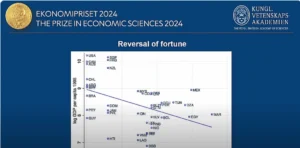Three US-based economists Awarded the 2024 Nobel Prize for Groundbreaking Studies on Institutions and Prosperity.
Daron Acemoglu, Simon Johnson, and James A. Robinson won the 2024 Nobel Prize in Economics, emphasizing the essential role of institutions in driving economic prosperity.
Introduction
 On October 14, 2024, Daron Acemoglu, Simon Johnson, and James A. Robinson received the Nobel Prize in Economics from the Royal Swedish Academy of Sciences. A. Robinson for their influential research on how institutions shape economic prosperity.
On October 14, 2024, Daron Acemoglu, Simon Johnson, and James A. Robinson received the Nobel Prize in Economics from the Royal Swedish Academy of Sciences. A. Robinson for their influential research on how institutions shape economic prosperity.
Their work emphasizes the crucial role of political and economic institutions in determining a nation’s success or failure, particularly in the context of historical injustices stemming from colonialism.
Who Are the Winners?
Daron Acemoglu
Daron Acemoglu is a Turkish-American economist and a professor at the Massachusetts Institute of Technology (MIT). His research primarily explores the interplay between political institutions and economic performance. Acemoglu’s work has significantly influenced our understanding of how different governance structures affect social welfare.
Simon Johnson
Also a professor at MIT, Simon Johnson is known for his contributions to macroeconomics and economic development. His research investigates how institutional frameworks can lead to financial crises and economic volatility, offering insights into the mechanisms of economic growth.
James A. Robinson
James A. Robinson, a professor at the University of Chicago, has extensively studied political institutions and their effects on economic outcomes. His work highlights the importance of inclusive political systems in fostering economic development and addressing inequality.
Research Highlights
The laureates’ research provides a comprehensive analysis of how historical and contemporary institutions influence nations’ economic trajectories. Their findings reveal that societies thrive when institutions are designed to benefit a broad segment of the population rather than a select elite.
Key Findings
- Institutional Foundations: Inclusive institutions that provide equal rights and access to resources are essential for greater economic prosperity.
- Impact of Colonialism: Their studies demonstrate that countries with extractive institutions established during colonial times have suffered long-term economic setbacks.
- Political Empowerment: Empowering citizens and involving them in decision-making processes leads to positive economic outcomes.
The Nobel Prize in Economics: A Brief Overview
 The Nobel Prize in Economic Sciences was established in 1968 by Sweden’s central bank in memory of Alfred Nobel. Although not one of the original prizes outlined in Nobel’s will, it has become one of the most prestigious awards in the field of economics.
The Nobel Prize in Economic Sciences was established in 1968 by Sweden’s central bank in memory of Alfred Nobel. Although not one of the original prizes outlined in Nobel’s will, it has become one of the most prestigious awards in the field of economics.
Previous Winners and Impact
The award carries a monetary value of 11 million kronor (approximately $1 million) and has been awarded to 93 laureates since its inception. The United States has produced the most winners, with notable figures like Milton Friedman and Amartya Sen among past laureates whose works have profoundly influenced economic thought.
The Importance of Institutions
The trio’s work underscores that effective institutions are foundational to economic development. They argue that inclusive political systems enable broader participation in governance, which is vital for sustainable growth. Conversely, extractive institutions—those designed primarily to benefit elites—tend to perpetuate poverty and inequality.
Case Studies
 Their research includes case studies from various countries that illustrate these principles:
Their research includes case studies from various countries that illustrate these principles:
- South Korea vs. North Korea: The contrasting fates of these two nations highlight how different institutional frameworks can lead to vastly different economic outcomes.
- Colonial Legacies: Countries like Ghana and Nigeria showcase how colonial-era institutions have shaped current economic realities, with Ghana benefiting from more inclusive governance structures compared to Nigeria’s extractive practices.
The Role of Economics in Society
Economics is not merely about numbers; it is deeply intertwined with societal well-being. The insights provided by Acemoglu, Johnson, and Robinson are particularly relevant today as nations grapple with issues like income inequality and economic stagnation.
Addressing Income Disparities
The award-winning economists emphasize that addressing income disparities is one of the greatest challenges facing modern societies. Their findings suggest that reforming institutions to be more inclusive can significantly contribute to reducing these disparities.
Conclusion
The 2024 Nobel Prize in Economics awarded to Acemoglu, Johnson, and Robinson highlights the vital role that institutions play in shaping economic outcomes. Their research reinforces the idea that long-term prosperity is achievable through inclusive political systems that benefit society as a whole.
As policymakers around the globe seek solutions to pressing economic challenges, understanding these dynamics will be essential for promoting sustainable growth. This recognition not only honours their significant contributions but also serves as a reminder of the intricate relationship between institutional frameworks and economic success.
As we move forward into an increasingly complex global economy, these insights will be invaluable for guiding future policy decisions aimed at fostering equitable growth.
